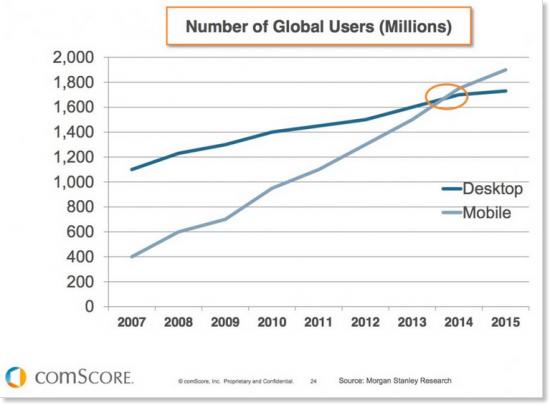After “Mobilegeddon” on April 21st of this year, when Google introduced the new mobile-friendly algorithm, many websites went mobile-friendly in order to climb Google’s search results. Google have always expressed their preference for mobile-friendly web sites, but this was a big push to encourage webmasters to optimise their sites for mobile devices.
And now, a new study shows that non-mobile-friendly websites are dropping out of the first page of Google’s search results on mobile devices, which is big news for businesses who haven’t already optimised their websites for mobile devices. Of course, this means that the top results on Google, which are the ones that get clicked, are dominated by mobile-friendly websites.
Whilst Mobilegeddon wasn’t as revolutionary as marketers and SEOs first thought, it appears that now the results are coming forth, and mobile-friendly websites are coming out on top. Businesses without a mobile-friendly website however, are missing out on those highly-sought first page rankings, which are vital to getting found online.

 When Google announced they were introducing a mobile-friendly algorithm months in advance, with a specific date to prepare for, people expected a seismic shift. This didn’t come to fruition straight away. But now, this could all be changing, with those who have switched to a mobile-friendly web design appear to have been rewarded.
So perhaps Armageddon for desktop sites on mobile devices didn’t quite come on April 21st, but now we are seeing results that prove the end times are here. And it’s only likely to get worse for websites who fail to go mobile.
When Google announced they were introducing a mobile-friendly algorithm months in advance, with a specific date to prepare for, people expected a seismic shift. This didn’t come to fruition straight away. But now, this could all be changing, with those who have switched to a mobile-friendly web design appear to have been rewarded.
So perhaps Armageddon for desktop sites on mobile devices didn’t quite come on April 21st, but now we are seeing results that prove the end times are here. And it’s only likely to get worse for websites who fail to go mobile.
 Despite this, it still shows that Google are serving around 20% non-mobile-friendly websites – although it’s likely this figure will decrease as time goes on. More websites will become mobile-friendly, alongside Google inevitably increasing the important of mobile-friendliness in the algorithm, which means non-mobile-friendly sites will drop out even more rapidly.
Overall, the study found that the amount of mobile-friendly websites depends on the vertical. Some industries opted for mobile websites more than others.
Retail had the highest number of mobile-friendly results, which makes sense due to the widespread B2C nature encouraging users to shop on their mobile device. Transportation had the lowest percentage of mobile-friendly websites.
Despite this, it still shows that Google are serving around 20% non-mobile-friendly websites – although it’s likely this figure will decrease as time goes on. More websites will become mobile-friendly, alongside Google inevitably increasing the important of mobile-friendliness in the algorithm, which means non-mobile-friendly sites will drop out even more rapidly.
Overall, the study found that the amount of mobile-friendly websites depends on the vertical. Some industries opted for mobile websites more than others.
Retail had the highest number of mobile-friendly results, which makes sense due to the widespread B2C nature encouraging users to shop on their mobile device. Transportation had the lowest percentage of mobile-friendly websites.
 Moovweb also found that many websites which became mobile-friendly after the Mobilegeddon announcement remained unoptimised for a truly decent mobile experience.
Between Q1 and Q2, it was found that there was only a 3% increase in mobile optimised websites, which deliver quicker loading times and cater to the specific device a user is on, making the website more usable on a mobile device. This means that many website owners took a shortcut ahead of the algorithm change, rather than optimising their website fully for mobile devices.
In conclusion, these results show that non-mobile-friendly websites are being impacted by the new algorithm change, and are seeing lower rankings because of it.
For any business which wants to reach the top of the search results, going mobile-friendly is a must. A responsive web design is widely regarded as the best option for businesses going mobile, and remains Google’s preferred form of mobile web design.
Moovweb also found that many websites which became mobile-friendly after the Mobilegeddon announcement remained unoptimised for a truly decent mobile experience.
Between Q1 and Q2, it was found that there was only a 3% increase in mobile optimised websites, which deliver quicker loading times and cater to the specific device a user is on, making the website more usable on a mobile device. This means that many website owners took a shortcut ahead of the algorithm change, rather than optimising their website fully for mobile devices.
In conclusion, these results show that non-mobile-friendly websites are being impacted by the new algorithm change, and are seeing lower rankings because of it.
For any business which wants to reach the top of the search results, going mobile-friendly is a must. A responsive web design is widely regarded as the best option for businesses going mobile, and remains Google’s preferred form of mobile web design.
 The statistics above from Google show just how important mobile traffic is nowadays – not only in quantity, but also the quality of traffic. Nowadays, people are much more willing to browse and even purchase on their mobile phone. This is down to a number of reasons, such as better and bigger phones, users are more accustomed to their devices now, but also that businesses have learned to provide an optimal experience on mobile devices to encourage this.
If you’re looking to have a responsive website built, or redesign your website with a mobile-friendly web design, then get in touch with the experienced team here at Xanthos to discuss your requirements.
The statistics above from Google show just how important mobile traffic is nowadays – not only in quantity, but also the quality of traffic. Nowadays, people are much more willing to browse and even purchase on their mobile phone. This is down to a number of reasons, such as better and bigger phones, users are more accustomed to their devices now, but also that businesses have learned to provide an optimal experience on mobile devices to encourage this.
If you’re looking to have a responsive website built, or redesign your website with a mobile-friendly web design, then get in touch with the experienced team here at Xanthos to discuss your requirements.


Mobilegeddon: The end times for non-mobile-friendly websites
On April 21st, Google introduced the mobile-friendly algorithm dubbed “Mobilegeddon” – which meant any website that isn’t mobile-friendly will fall down the search results. On the other hand, if you had a mobile-friendly website, you could see your site gain rankings up the search results. Thousands of businesses got mobile-friendly websites to welcome in April 21st, hoping for more mobile traffic and higher search rankings. It was a good move overall, However, when the deadline day arrived, not too much happened. Even in the week or two afterwards, there wasn’t too much of a change. Saying this, there were still shifts in rankings, but largely it didn’t have the impact people expected. Why were businesses so set on gaining mobile rankings? Well, because this year mobile internet usage officially overtook the desktop, as you can see below. When Google announced they were introducing a mobile-friendly algorithm months in advance, with a specific date to prepare for, people expected a seismic shift. This didn’t come to fruition straight away. But now, this could all be changing, with those who have switched to a mobile-friendly web design appear to have been rewarded.
So perhaps Armageddon for desktop sites on mobile devices didn’t quite come on April 21st, but now we are seeing results that prove the end times are here. And it’s only likely to get worse for websites who fail to go mobile.
When Google announced they were introducing a mobile-friendly algorithm months in advance, with a specific date to prepare for, people expected a seismic shift. This didn’t come to fruition straight away. But now, this could all be changing, with those who have switched to a mobile-friendly web design appear to have been rewarded.
So perhaps Armageddon for desktop sites on mobile devices didn’t quite come on April 21st, but now we are seeing results that prove the end times are here. And it’s only likely to get worse for websites who fail to go mobile.
The study: How mobile-friendly websites dominate search results
Having a mobile-friendly website isn’t just about having a website people can use on their smartphone or tablet. It also now heavily impacts your search engine rankings, as Moovweb proved in their recent study. During this study, 1,000 important ecommerce keywords in different industries were used in order to see how mobile rankings have changed. What the study found, was that for 83% of these searches, the top result was mobile-friendly. Additionally, 81% of these searches had mobile-friendly sites dominate the top 3 results. On the first page of the mobile Google SERP, which accounts for the top 10 results, 77% of results were mobile-friendly websites. You can see a visual version of this below. Despite this, it still shows that Google are serving around 20% non-mobile-friendly websites – although it’s likely this figure will decrease as time goes on. More websites will become mobile-friendly, alongside Google inevitably increasing the important of mobile-friendliness in the algorithm, which means non-mobile-friendly sites will drop out even more rapidly.
Overall, the study found that the amount of mobile-friendly websites depends on the vertical. Some industries opted for mobile websites more than others.
Retail had the highest number of mobile-friendly results, which makes sense due to the widespread B2C nature encouraging users to shop on their mobile device. Transportation had the lowest percentage of mobile-friendly websites.
Despite this, it still shows that Google are serving around 20% non-mobile-friendly websites – although it’s likely this figure will decrease as time goes on. More websites will become mobile-friendly, alongside Google inevitably increasing the important of mobile-friendliness in the algorithm, which means non-mobile-friendly sites will drop out even more rapidly.
Overall, the study found that the amount of mobile-friendly websites depends on the vertical. Some industries opted for mobile websites more than others.
Retail had the highest number of mobile-friendly results, which makes sense due to the widespread B2C nature encouraging users to shop on their mobile device. Transportation had the lowest percentage of mobile-friendly websites.
 Moovweb also found that many websites which became mobile-friendly after the Mobilegeddon announcement remained unoptimised for a truly decent mobile experience.
Between Q1 and Q2, it was found that there was only a 3% increase in mobile optimised websites, which deliver quicker loading times and cater to the specific device a user is on, making the website more usable on a mobile device. This means that many website owners took a shortcut ahead of the algorithm change, rather than optimising their website fully for mobile devices.
In conclusion, these results show that non-mobile-friendly websites are being impacted by the new algorithm change, and are seeing lower rankings because of it.
For any business which wants to reach the top of the search results, going mobile-friendly is a must. A responsive web design is widely regarded as the best option for businesses going mobile, and remains Google’s preferred form of mobile web design.
Moovweb also found that many websites which became mobile-friendly after the Mobilegeddon announcement remained unoptimised for a truly decent mobile experience.
Between Q1 and Q2, it was found that there was only a 3% increase in mobile optimised websites, which deliver quicker loading times and cater to the specific device a user is on, making the website more usable on a mobile device. This means that many website owners took a shortcut ahead of the algorithm change, rather than optimising their website fully for mobile devices.
In conclusion, these results show that non-mobile-friendly websites are being impacted by the new algorithm change, and are seeing lower rankings because of it.
For any business which wants to reach the top of the search results, going mobile-friendly is a must. A responsive web design is widely regarded as the best option for businesses going mobile, and remains Google’s preferred form of mobile web design.
Why Mobile Matters
If your website still isn’t mobile-friendly, not only could you be presenting potential customers with an unusable website on their device of choice, but you could also be appear lower on Google. The statistics above from Google show just how important mobile traffic is nowadays – not only in quantity, but also the quality of traffic. Nowadays, people are much more willing to browse and even purchase on their mobile phone. This is down to a number of reasons, such as better and bigger phones, users are more accustomed to their devices now, but also that businesses have learned to provide an optimal experience on mobile devices to encourage this.
If you’re looking to have a responsive website built, or redesign your website with a mobile-friendly web design, then get in touch with the experienced team here at Xanthos to discuss your requirements.
The statistics above from Google show just how important mobile traffic is nowadays – not only in quantity, but also the quality of traffic. Nowadays, people are much more willing to browse and even purchase on their mobile phone. This is down to a number of reasons, such as better and bigger phones, users are more accustomed to their devices now, but also that businesses have learned to provide an optimal experience on mobile devices to encourage this.
If you’re looking to have a responsive website built, or redesign your website with a mobile-friendly web design, then get in touch with the experienced team here at Xanthos to discuss your requirements.













